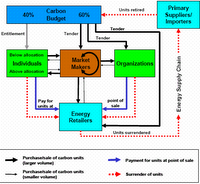Personal carbon trading
 The Guardian reports on "Swipe-card plan to ration consumers' carbon use" - it looks like the idea of a personal carbon trading scheme is in the air again, following a ministerial speech. Each of us would be given an allowance of carbon emissions, our use of carbon would be recorded and if we over-used our budget, then we would buy carbon from those who had under-used their budget. In 2005, the Tyndall Centre published a report on Domestic Tradable Quotas that underpins the excitement (Click graphic on the left)
The Guardian reports on "Swipe-card plan to ration consumers' carbon use" - it looks like the idea of a personal carbon trading scheme is in the air again, following a ministerial speech. Each of us would be given an allowance of carbon emissions, our use of carbon would be recorded and if we over-used our budget, then we would buy carbon from those who had under-used their budget. In 2005, the Tyndall Centre published a report on Domestic Tradable Quotas that underpins the excitement (Click graphic on the left)
Let us be clear: however robust this is in theory (and it has much to recommend it in theory) this is a non-starter. The reason it is "easy to dismiss the idea as too complex administratively or too much of a burden for citizens" is for the good reason that this is, in fact, true and an understatement. As soon as this becomes mandatory, which it would be in the system envisaged, a truly enormous system of transactions, monitoring and verification would be necessary. The question is not whether it could be done (it probably could given unlimited resources and a suitably compliant population). The question is whether the costs and complexity are justified compared to the alternatives, of which there are many simpler and cheaper approaches available.
However, this does not mean that nothing can be done to personalise the carbon footprint:
- Provide more information about carbon consumption - fuel bills, at the petrol pump, with airline tickets, on products with appliances. This would help create a carbon currency, just as many of us look at the fat content of food we eat.
- A personal trading system creates large information and transaction costs for the individual, we should be reducing the burden of meeting carbon targets - more could be done to regulate bvehicles, appliances, buildings, devices etc. Regulators should save carbon on behalf of all of us and save the effort and cost of doing it.
- Encourage more voluntary 'carbon off-setting' so that people invest in renewables or energy savings funds to compensate for their energy use
- Use the tax system with a proper carbon tax rather than a trading system to create an economic price signal.
- Introduce the carbon trading scheme designed by the Carbon Trust for non energy-intensive users - as envisaged in the DTI's Energy Review (2.7) taking in 5,000 firms in addition to those large emitters already in the EU emissions trading system. This is a bold and exciting initiative... much better to focus on getting that to work.
- Include energy supply companies (electricity, gas, motor fuel) in a capped emissions system so that they have incentives to develop businesses in energy saving - IPPR has made proposals in this area.



1 comment:
Caroline's comment:
I recognise this has the potential to be a bureaucratic nightmare. However, it also has the potential to spark a whole series of debates around the issue such as this we are having now.
I think if applied to a few areas, specifically travel - and especially flights and buying petrol, it could play a significant role in reducing our carbon use and putting value of carbon into the public psyche (as opposed to most of our consumer rationalisations being based on financial cost).
I think this gives people a real way of recognising the impacts their actions have on the climate. Whereas a carbon tax is 1.Easily misinterpreted as just a way for the Chancellor to raise more revenue, and 2.Wouldn't make the same connection in people's minds that they were changing their behaviour for an environmental rationale.
Ofcourse there would have to be policies to address the fuel poor, or those who live in the country and have little access to public transport. But there's no reason these can't be worked into the scheme.
Post a Comment